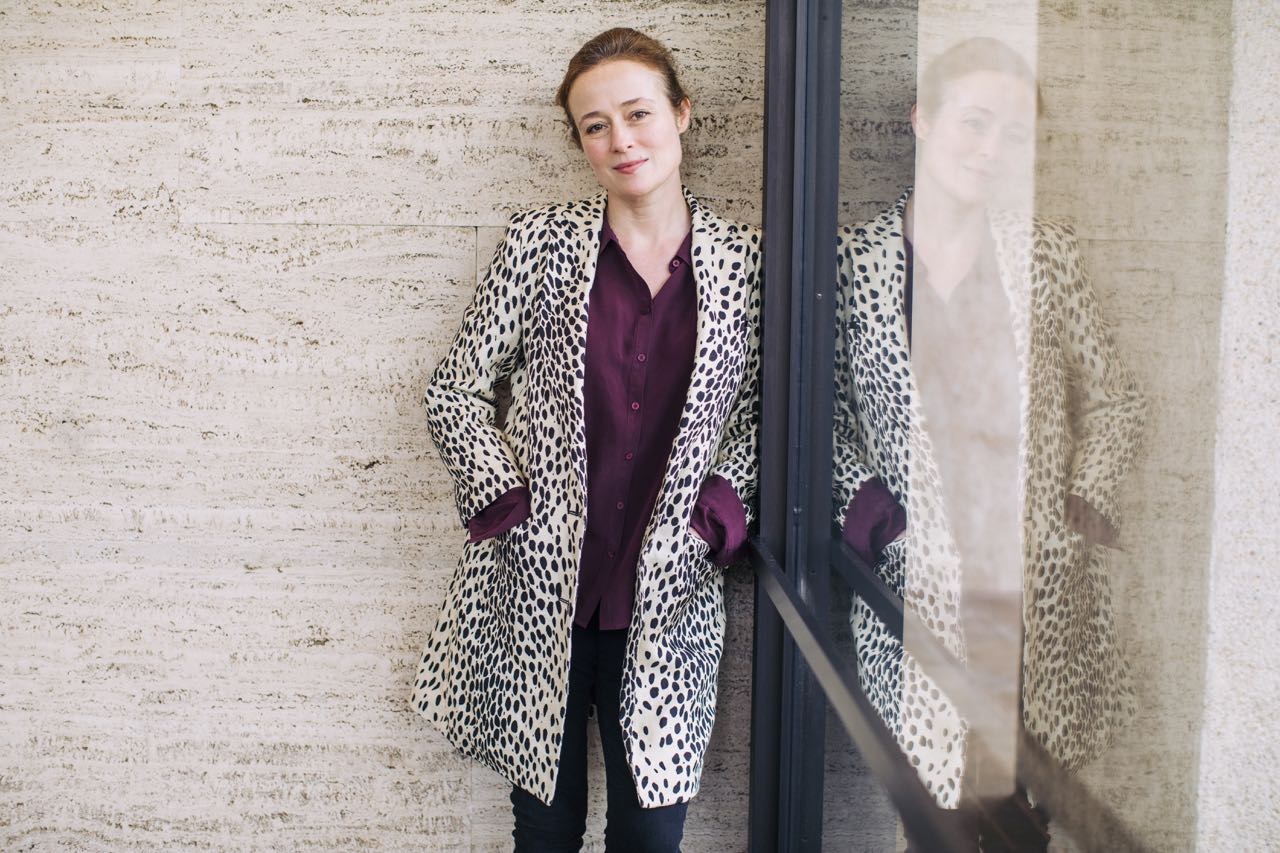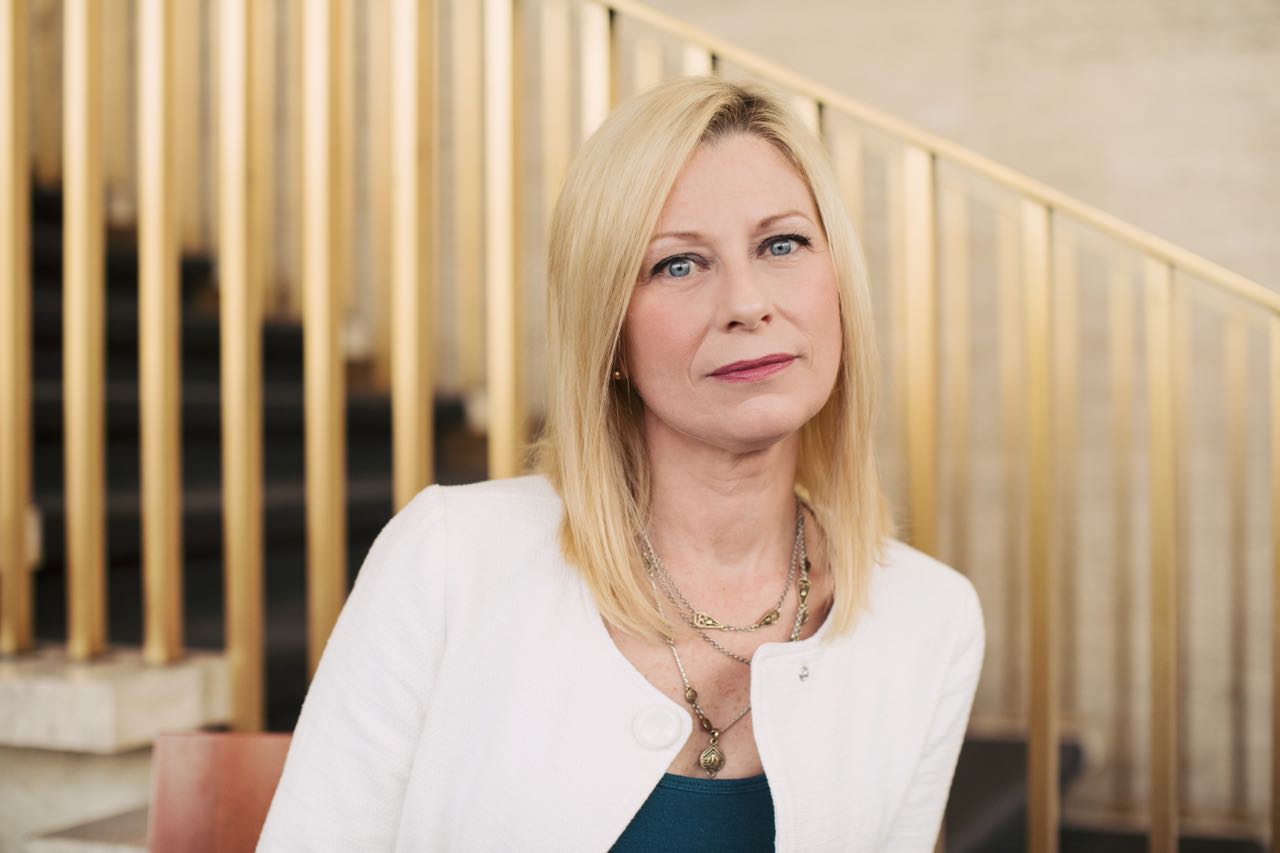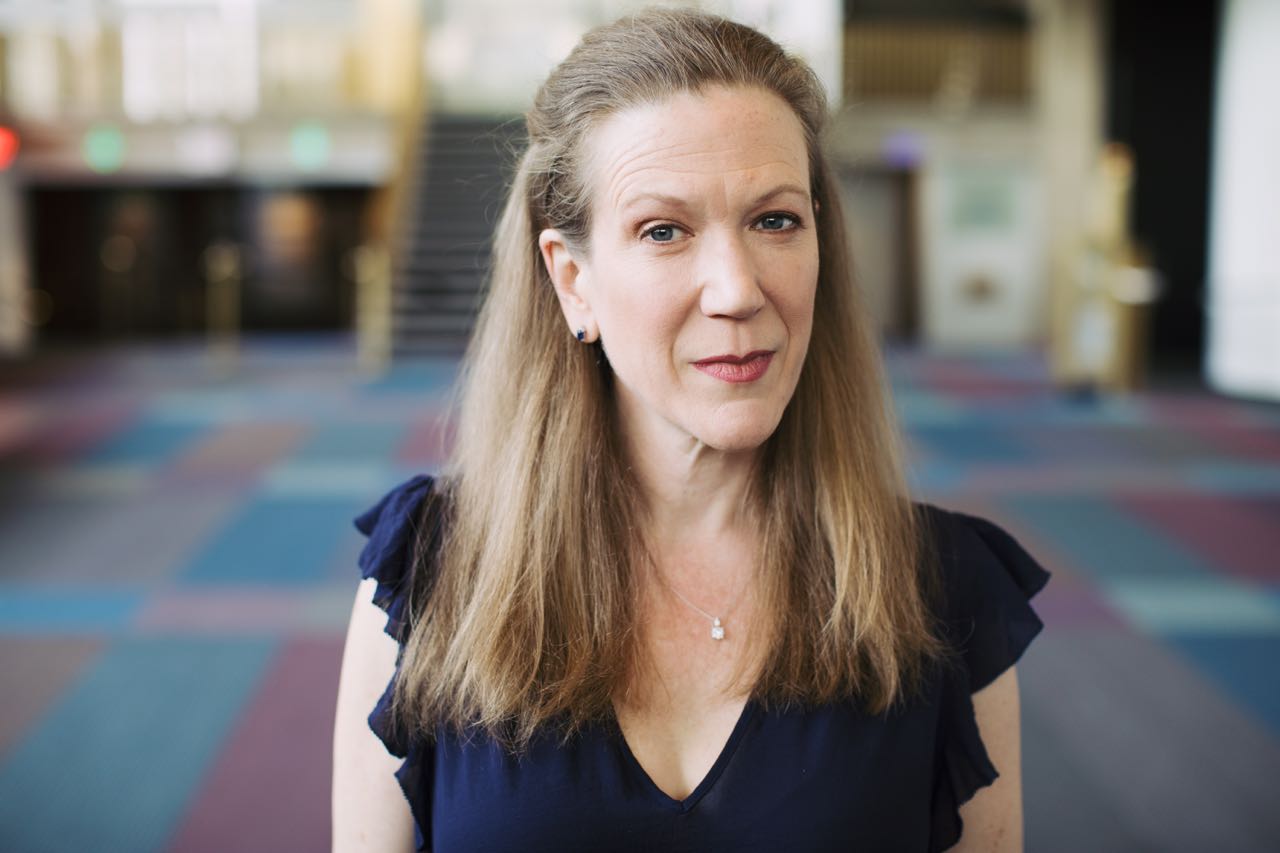Jennifer Ehle, Angela Pierce, and Henny Russell on “Oslo”

Written by Victoria Myers
Photography by Jacqueline Harriet
May 9th, 2017
In the winter of 1994, The Paris Review interviewed Israeli author Amos Oz and, in answer to a question about, “If Israelis and Palestinians simply sat down and got to know each other better, wouldn’t that be helpful?,” Oz replied, “It is another misconception of the West: they assume that the Israelis and the Palestinians need to get to know each other better… As if the Arab-Israeli conflict were just a misunderstanding.” Lincoln Center Theater’s production of Oslo by J.T. Rogers and directed by Bartlett Sher, which was recently nominated for a Tony Award for Best Play, both contradicts and, in some ways, supports his theory: other cultures are not just Americans in a different climate. The play tells the behind-the-scenes story of the 1993 Oslo Peace Accords, when Norwegian diplomats held secret meetings between representatives of the Israeli government and PLO [Palestinian Liberation Organization] in a castle in Norway. Of the fifteen cast members in Oslo, there are three women: Jennifer Ehle, who was nominated for Best Actress for her role; Angela Pierce; and Henny Russell, all of whom were also in the production’s Off-Broadway run. We recently sat down with the three of them to discuss how they put together their performances, playing characters with different worldviews, how the themes of the play resonate with them, and their plan to make t-shirts that say, “The world will be changed by funny women.”
Going way back to when you were in rehearsal for the Off-Broadway run, do you all like to come into rehearsal with a lot prepared, or are you more like, “Let’s see what happens in the room”?
Jennifer: I usually like to be off book when I start rehearsals. For this, I was not at all off book, and I was also starting from the ground with the accent. So it was a steep learning curve. There was a lot to grapple with from the beginning. I loved it though. It was one of the most extraordinary rehearsal times. It was a great room to be in. It was really fun. But it was lovely to come back to it and have a little bit of a handle on the accent and to be off book.
Henny: See, I’m the opposite. I never want to come to rehearsal off book.
Jennifer: Why?
Henny: I think because the lines go with the movement and the intention, so until I know really fully what I’m doing, I can’t know what I’m saying. I also memorize really quickly, so it’s not a problem later on. I grew up undiagnosed dyslexic, so in junior high, nobody could figure out why I was in advanced math and advanced science and remedial reading. When I started acting at the ripe old age of 12 or 13, if I had the script in my hand, I would make mistakes, so I just taught myself to memorize everything so that I wouldn’t make mistakes and embarrass myself. When you teach yourself how to do something at 13 and then you practice it for many years, it just becomes easy.
Jennifer: I just like to know them so well. I want them to be in my bones. So that I can, as my mother [Rosemary Harris] says, fling them around like a dead cat. I don’t know why anyone says that. They don’t know what it means, but I do know what it means.
Angela: That’s an amazing image.
Jennifer: So that you can taffy stretch it and manipulate it. I find I’m more likely to get stuck in a way of saying something if I don’t know them all coming in.
Henny: And I feel the opposite. If I know them coming in, I feel I’ll get stuck into that pattern.
Angela: I’m kind of a mesh between the two of them because I completely love the flinging cat thing because then you have so much freedom, but I also attach muscle memory to lines and movement too. But also, way back when we were in the Mitzi, I was the last person to come in, so my very first rehearsal was on stage. And that was terrifying, so I kind of had to be off book and in German. I had to be memorized. It was incredibly exciting.
Henny: But you could have faked it and none of us would have known.
Angela: When we came back [for the Broadway run], from the very beginning it was in the room. But having had the Mitzi, it was such a godsend to have had that experience. I remember old blocking from last year now, because your body memorizes things.
Jennifer: We were at that stage in the first week of rehearsals downstairs but you’d just arrived there.
Henny: We all had cheat sheets in our pockets.
Jennifer: Yes. Even throughout most of the run last summer and certainly for the first couple of weeks this time.
Henny: You’d come off stage, “…what’s next?”
Jennifer: In the intervening months since we last did it, I now really have to wear reading glasses whereas I didn’t last summer. So I’d get my cheat sheet out in our dressing room and I would go out and I realize I don’t have my glasses on. I’m looking at it really carefully under the light and I’m then like, “What does it say, where do I go next?” And it says, “Run to upstage left.” And I go, “I’m late!” I’m supposed to be running this whole time and I’m trying to read the darn thing.
Henny: She runs a lot.
Jennifer: Most of my off stage movement is running from one exit to the next entrance.
Angela: Because you’re on stage almost the whole time.
Jennifer: A lot of it.
Angela: Unless you’re running to get to the next place.
Henny: I have a moment of that muscle memory terror every night because there’s that scene that was cut and I hear the cue. There was a scene that was in the entire run at the Mitzi and then was cut after the first preview up here. But I’m still not used to it after that muscle memory. And I hear the cue and I get nervous.
Angela: Isn’t it amazing how you process information? Mind, muscle, heart, soul, all of it. How it goes in. It’s fascinating to me.
Now that you’re in a different and bigger space, does it affect your process? Especially if you’re linking dialogue to movement and blocking that was in the smaller space. Did you have to recalibrate things?
Jennifer: I think it was so recalibrated in the rehearsal room that by the time we brought it to the space it was kind of done.
Henny: Bart didn’t just restage it. We went back into rehearsal. A full four weeks where we took it all apart and put it back together again. It’s basically another production in lots of ways. And he would bring us into the space in rehearsal, not that we could rehearse there, but just to have a sense of the size and the height of the house, which is different.
Angela: We also worked with an amazing vocal dialect coach, Liz Smith, who Jennifer’s worked with before and who Henny’s worked with before and who I know from school.
Jennifer: She’s amazing anyway, but she knows the thrust very well and how to vocally work [with it]. I did three plays with her in the Beaumont before so she knows the space really, really well.
Angela: She’s done so many in there. She’s one of those people with generations and generations of great experiences and learning and you’re just sort of like, “What else?” You want to know.

What was your process for incorporating research into your performances? You’re dealing with big, historical topics, but at the same time, research isn’t necessarily a playable thing for actors.
Henny: Well, the Swedish Hostess is fiction, so I didn’t have to research anything on her. Just act aloof and judgmental.
Jennifer: And sexy.
Henny: And sexy. I did research Marianne Heiberg. There’s not as much information on her. You’ll see her in the videos, but never in the forefront. She’s always in the background. But I did read up on her career and her education because I did want to know what kind of person she was. What kind of strength she had, or not. What kind of relationship she had with her husband. But there was no imitation involved because there didn’t need to be. I guess some people have to do more of an impersonation.
Jennifer: I don’t think anybody has to. It seemed to be very much left up to what people wanted to take on. It’s hard if you’re playing someone iconic like Peres, I think it would be hard not to [do some sort of imitation]. If the audience comes in with a preconception of how that person will look and would recognize, then you can’t really ignore that. But the rest of us really weren’t in that position.
Henny: Yes, because that wouldn’t be the case with most of us. And Toril is a real person and her daughter actually came to the show from Norway. But again, there wasn’t a lot of information on her.
Angela: Did she have news clippings and stuff that she showed you?
Henny: Yeah.
Angela: Of her Mom?
Henny: Yeah.
Angela: Wow.
Henny: But I sort of based her on my mother who was from Norway. I’m not really imitating my mom, just sort of drawing on my experiences in life.
Jennifer: I learned quite a bit about the character I play, Mona. And both our director and playwright know Mona. But I used the script as the foundation and built from there and added in little bits of seasoning of things that I learned about the real Mona. But the script was the foundation.
Angela: I researched the time period, as far as what was going on historically and stuff and what was happening. And then Norway, which was exciting because I’ve never been there. And then what was happening in Palestine and Israel and that whole conflict, and then learning lots of German, which was fun. It’s exciting because I got an education, not only through J.T.’s work but through research. I love research—what was politically happening, what was artistically happening, all of those different things. Because they all influence everything that we do.
Jennifer: I found a really long, wonderful interview with Liv Ullmann that I watched a lot. I didn’t take any bits of it, but it was just because there was something so “other” about the way that she thought and the way that she would link thoughts together that was so foreign and so Scandinavian. But not the kind of stereotypical version. Sometimes people have an idea of the Scandinavian people being sort of cold and sort of exact.
Angela: Yeah. Don’t be so Norwegian. Doesn’t Larsen even say that, “You’re so Norwegian”?
Jennifer: Yes, he does.
Jennifer: Liv Ullmann has a slightly different [quality]… warm isn’t the right word, but she has something that I like. There was a quality she had that I found a good way culturally. And then, what was amazing was when Liz came, because Liz didn’t do our dialect [coaching] the first time, the accent that we ended up using as a base was Liv Ullmann. But in an interview 40 years after the one that I had watched so much.
In playing people of different nationalities, did you take into consideration how they viewed the world and that they’re not coming at it from an American point of view? Especially for this particular piece where point of view and cultural differences are so much at the heart of it.
Jennifer: I think that’s what I found with the Liv Ullmann interview. I was sort of trying to get a sense of how she viewed the world. Because she’s a bit more out there and allows herself to be a bit more open than I think probably the real Mona does. But there was something ethereal yet grounded. I liked that for Mona. The real Mona, listening to interviews of her, of course, was very helpful for her point of view of the world and how she functions as a diplomat and as a Norwegian diplomat, going forth in the world representing her country.
Henny: There were two things that I focused on. One is, I think, in a very general sense, that other countries tend to be more aware of world events than Americans. And certainly, these particular people are very aware what’s going on in the world. Something Bart kept stressing was part of what Marianne objected to with Terje’s character is how he was trying to make himself grand and draw attention to himself, and that the Norwegians are very much not [trying to] draw attention. So that aspect, which Bart kept bringing up, is a typical Norwegian trait.
Angela: Bart also talked about in rehearsal what women are [in different cultures]: how they’re valued, how their opinions are valued, where they stand. Do they stand back or do they stand in front? How can they insert themselves? And that was something Bart had mentioned; just how the Palestinians are in dealing with the female characters and how the Norwegians are in dealing with the female characters. I found that really interesting. Because there are three of us and we’re in a room full of men and very much male personalities. And what is that like from culture to culture?
Jennifer: I listened a lot to interviews with Mona, but also interviews with the current Prime Minister of Norway, who’s female. Just to have an understanding about that, about the sexual politics. Because all the Scandinavian countries, it seems, that they had a women’s rights movement that went right into politics. Which is not what happened to ours. We don’t even have an amendment.
Angela: Not at all. Isn’t that odd? We’re considered so advanced in some ways and so not advanced [in others].
Jennifer: We don’t even have an equal rights amendment. [In Norway] so many women went into politics, which is why they have 52 weeks of maternity leave and things like that. Their feminism is in such a different place in Norway than it is in America, and to play this part you’re constantly having to remind yourself that she is just a human being in the room when she’s in there with the Norwegians. She herself has complete faith and complete certainty that she is there as a human being. It’s hard, I think, as an American woman to imagine that. Because that’s not what we receive.
Henny: And Norway just surpassed Denmark as the happiest country in the world. Coincidence? I think not.

When you’re working on a show with lots of scenes and some time jumps, and scenes with their own mini arcs, how does that affect how you calibrate your performance?
Jennifer: That’s interesting. Well, it would be different for all three of us. I mean it would be different anyway, but with Henny playing three different people.
Angela: I get to play two.
Jennifer: And you get to play two different people and I’m, in a way, playing two different people because I’m the narrator and then the person actually who’s in the story.
Henny: I never thought of it that way, that’s interesting.
Jennifer: I’ve got two different plots. One of them is her in the moment and the other she’s retelling the experience. Everybody works differently, but if you work with actions and objectives, then you just string your beads that way. It’s sort of hard not to reduce every bit of a character’s impulse down to its smallest fraction and then kind of build from there. So it’s sort of the same, I think. Every scene really ends up being an arc for any part, I suppose. There’s always going to be something you want and yet there’s a large arc as well.
Angela: I was just thinking that you’re coming from somewhere and you’re going somewhere, and somehow, in the middle of all of that, there is action. A problem may be solved or something’s in the way of your need and your want and just reducing it down to that. But then just be honest and real within whenever the moment presents itself. Because from night to night we’re all different, but within the same boundaries of the story, which is exciting.
Henny: I don’t know if the process is different. It’s an interesting question, but I don’t think it is.
Jennifer: Because I’m not sure that the arcs are smaller or larger in this than in any other play really. Jumping around in time and stuff, it’s just something else to track, but I don’t think it’s actually a different process. There’s a thing, though, that’s true of this play on so many levels and it’s part of J.T.’s brilliance as a writer, is that it’s so woven in. In diplomacy there is always the double game. There are two chessboards. There’s the chessboard you see and then there’s the one under the table, which is also being played constantly, that you don’t see. And the play is sort of structured that way with the narration. It’s just a little bit more complex. All the characters have their two things.
The play deals with a lot of big issues, but for each of you, what do you find most resonates for you on an individual level?
Henny: Well, that’s easy for me because when we were downstairs in the Mitzi, when we got to the scene where the boys are almost coming to blows and Terje comes in with the waffles, Bart and J.T. decided there needed to be more dialogue in this section. And when my mom passed away, my sister and I made a book of her recipes and pictures of my mother, and J.T. said, “Can I take a look at your mom’s waffle recipe?” And I said, “Of course.” And the next day when I got my new page my eyes filled with tears because what this lovely man gave for me to say was, “This is the waffle recipe of my mother.” And then I go on to describe my mother’s waffle recipe. So when you say on a personal level, that’s what it is.
Angela: You’re making me cry.
Henny: I know. That’s what resonates so deeply with me every night, on a very personal level, because he was so lovely to give me that gift.
Jennifer: I find there are so many things that resonate. I love the fact that it is incredible to have a chance to play a woman who is allowed to stand on a stage and say that she must, at all costs, protect her career, and for her not to be judged by anybody for saying that. That’s a kind of extraordinary thing and I think highly unusual. There’s never a moment where she talks about, “What will happen when I have children?” That she’s allowed to just fundamentally be a creature of her career and her marriage and that there isn’t any conflict in those two things beyond the conflict of these two people doing what they’re doing and trying to navigate that. So I find that very powerful. It’s a real privilege to get a chance to stand there and say that and play her. I think the hope of the play and the fact that these two people had such extraordinary courage. I don’t think I took the courage on when we did it at the Mitzi. There were just so many moving parts and there was so much to grapple with—just where to put the chairs—but to actually think of how incredibly courageous it is that these two people decided to actually attempt this. And did it. It is really extraordinary.
Angela: I am just incredibly excited about coming to work here every day with an incredible cast, the incredible story. With the idea of carrying hope to 1,100 people every night. And that’s a great thing. I went to college right across the street, and now I get to work here—that, to me, is my personal best. And with such an incredibly talented group of actors and Bart and J.T. and the crew and the staff.
Henny: I think what J.T. has done with the play is what Terje’s process is: making the impersonal personal. If this play was just about the negotiations, it would be a very dry, dull, boring play. And what J.T. does is you get to know the people and there’s so much humor. You become invested through the personal, so it makes the impersonal personal. And that’s exactly what Terje’s process was about. But that’s what J.T. has done for this play.
Jennifer: It’s an extraordinary piece of work.
Henny: I’m always reminded of that when Terje talks about that process in the beginning. And then the speech at the end with the door being open and just feeling like that’s exactly what J.T.’s done with the play.
Jennifer: A friend of mine asked me, “As the actor, what does it mean to you?” Came to see the show. And that’s exactly it. It was the idea of hope and…
Henny: The door’s open.
Jennifer: And you can walk through it if you choose and it is possible. But you have to choose.

I wanted to ask you all one of my favorite questions to ask actresses, which is: In an industry that’s so—especially for women—into typecasting and telling you who you are, how do you still continue to develop as people and as artists with all of that stuff going on?
Jennifer: It’s difficult, because you have such little control over how you’re placed in the industry. You can choose the parts you take out of what you are offered. And of course you can choose what you go forward for a lot of the time. And there’s always an opportunity to change people’s minds and change people’s preconceptions. But really, I think it’s about courage and perseverance and thinking outside the box for yourself, and a whole lot of tenacity and good fortune.
Henny: I have a strange story to tell to answer your question. Years and years and years ago, I was probably in my twenties, I was with two male friends of mine and I, for some reason, said, “You know, for the first time in my life I had this idea of trying to think about God as female.” Because I realized I had always thought of God as male. And just for shits and giggles I decided to try to think about God as female and realized it completely changed my relationship. Then I tried to think about God as genderless and that also was different. One of these men remarked, “Well, if God was female then God would be less powerful.” And I said, “I’m sorry, we’re talking about God. You know, omnipotent, all-seeing God. How could God be any less powerful? Because it’s God!” And it was so shocking to me and I called my sister, who’s seven years older than me, and I said, “I cannot believe that there are still men in this country who think men are superior.” And what my sister said to me was, “I’m so glad to hear that this is the first time that thought ever occurred to you. Because I’ve felt that way my whole life.” She was actually thrilled that it wasn’t until I was 26 that it actually occurred to me that men viewed women as inferior. So that has stayed with me. And trying to view myself and my career and other women as I view them and not as anyone else views them. And the hope of the next generation and the one after that and the one after that, that things are changing. So to know that it is shifting, and to keep in mind that it’s an evolving process and that I want to be part of that and try to keep pushing it forward.
Angela: I never much liked when people said that I couldn’t do something because as soon as they said I couldn’t do it, or it’s not really meant for me, I wanted to do it 150% even more. So it was like, “Well what do you mean I can’t play Richard III?”
Jennifer: I really want to see that.
Angela: I want to play Richard III so badly. And I was listening to somebody like Fiona Shaw or Vanessa Redgrave talk about not having limitations, or at least trying to think outside the box and continuing to push the envelope. Those kinds of actors were people that I was like, “Yes! That’s me. I want to be that.” I want to keep striving. And then Fiona Shaw goes and she plays Richard II. It’s incredible. And you have Vanessa Redgrave, this powerhouse actor, who’s still doing it. That’s a great example of how not to be put inside a box. So that’s what we hopefully strive for and give the next generation: that you actually can. You just might have to do it a little bit more for yourself, but try and make your opportunities if you can.
Jennifer: And I do think the world will be saved by funny women.
Henny: There’s a lot of fierce women out there.
Jennifer: We’re just getting more and more.
Henny: We need to make a t-shirt that says that. The world will be saved by funny women.
Jennifer: The world will be changed by funny women, maybe that’s better than saved.
Angela: I want that as a t-shirt.

